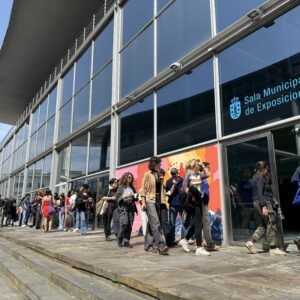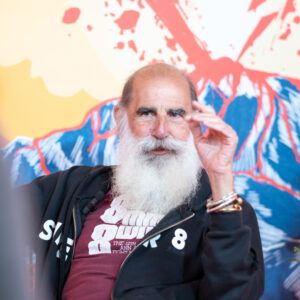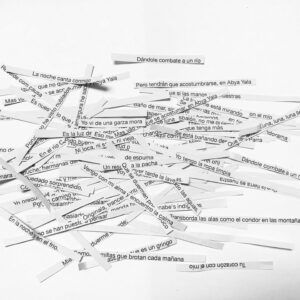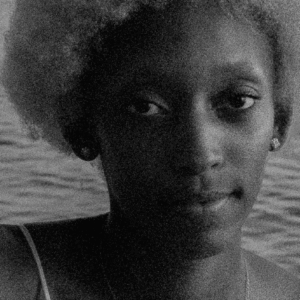Interview with María Ruido. About Motherhood, Mainstream Feminism and Other Questions to (re)think
Tell us about your first works and your link with A Coruña.
The proposal of Le Paradis is about recovering my first works in front of the camera, not behind, and closing this circle to relate them to the time when I still lived in Galicia since I was partly working here. Indeed, they are video action works closely linked to my doctoral thesis, on feminism, feminist film theory and the on-screen representation of women’s bodies. And, many of those lines reappear, and I think it’s not a coincidence, in this last work, but they’re there from the beginning. The truth is that the proposal of Angel and Ana seemed very timely, because they were filmed here, at the film school, at the old school of image and sound, and somehow it has a lot to do with those beginnings here.
Change of strategy, although you stay in focus. How did you go from those first performances to a work like La memoria interior, in which you resort to your privacy but you are not so much in front of the camera, which has more to do with the recovery of a personal file (which marks a little the path that you will follow later)?
They ask me continuously. On the one hand, it is true that all my works are very subjective and my body is very present. Also when you study a lot, you are very conscious or you start to be aware that there is something of reification whenever you put a body in front of the camera, and more if you are a woman, and I am a very good student of Laura Mulvey, somehow I retired to go on camera as such, especially as a character. That awareness of being on the screen got bigger, but I always say that it was a natural step, to go from a personal body to a collective one, to go from narrating it from the body to narrating it with the body, but in another way and taking into account that collective body, that memory that we could say is one of the threads that guides all my work. So it was a very fluid step. It is also true that the internal memory was a kind of experiment because it is my first film and I did not know it was an audiovisual essay, or I was not very aware of knowing it. I knew that I did not want to make fiction, but neither I was convinced by the forms of the documentary or the author’s documentary. And, on the other hand, I had this very strong reference that is Margarite Duras, which is still a reference and that is very present in the exhibition: the way to tell the story or make historical contra narratives was to speak in the first person. And it was an attempt, an intuition, which was very fruitful because it gave way to a series of works. I have always said, all the films that I have made later are inside La memoria interior.
Your work is closely linked to writing and reading. How do you work these two aspects, writing, and editing? Are there parallels, does one help the other? Calling your program The thinking image comes from your movies, like writing. It seems they help you to order ideas and connect them.
Absolutely. For me, editing, which is the key to the construction of the film, works as when you are editing a text. Editing in the video is said in the same way, and I think it has a lot to do with writing, in a certain way it is ordering a series of ideas, proposing a thesis, at least proposing questions, which I think is what my works propose. I come from the world of theory, of history, I studied contemporary history, history of art, then cultural studies, and of that rethinking from the word to the image. It is true that we are in a very logocentric world, despite the multiplicity of images, we have an education closely linked to the word, and the word is in a hierarchy even greater than the image. When talking about thinking about the world, making an essay, everybody thinks about doing an essay with words. But in this process of circulating from the word to the image, I have learned that the image is a very powerful instrument and very powerful politically to think about the world. But evidently that circulation between ideas that are born from words and books, and that go to images is there. Many of them are sociology, anthropology essays, and not in vain, when I used to talk about my doctoral thesis, and I talked about film theory, indeed, for me, the first and the great cinematographic referents are women who make films but who also write. That circulation between word and image, and that fluidity of passing from one medium to another, which I like a lot in Laura Mulvey or Martha Rosler, Adrian Piper, or even Agnès Varda, who does not write as such, but works a lot with words. They are there, they are very evident. Literature, even novel, not only essay, is very important for me.
Do you have the impression that you are between two worlds?
All my life I have had the feeling of not being in the right place ever. In between. I have graduated in one thing, I have doctored in another, I am teaching at a faculty that I had never stepped on before teaching, I started in the world of performance and art, but my works are seen in film festivals and museums My work is difficult to fit, it is uncomfortable, on the one hand, because it would be more pleasant to be better classifiable, but I think it has that complexity and that richness. On the other hand, the complexity in which we move and that belongs to the world in which we live, because there are many things that are ‘in the middle of’. I feel very close to the works of Hito Steyer, Ursula Uman, or even Harun Farocki of recent years, which are classified as museum cinema, because in the museum we are not objectualizable pieces, we are not artistic objects, but they are also seen in Film festivals or in the film circuit. It is an uncomfortable, complex situation, but it also allows you to work without fees, making your own genealogy, and that is very rich.
How do you get to Mater Amatísima?
The remote origin of the film is Engels, and his essential book The Origin of the Family, Private Property and the State, a book that I read being very young because I have a Marxist education that explains that the family is a microcosm that reproduces the state and reinforces it, and in some way, if we do not change the structures of coexistence and family models, we will never be able to change the structure of state policy. But nevertheless, this does not happen. The film begins with a conversation between Alexander Kluge and a theater director who talks about Medea’s myth, about an interpretation of the feminist and radical myth of Medea, which I share, because I have always thought that interpretation of the myth saying that Medea killed her children out of jealousy was very banal. Indeed, what Medea does to defer to herself as a political subject because she has no place in a hyper-patriarchal society like classical Greece, and she differs it in a man who betrays her, and at the same time, that betrayal causes her children to be without political rights because they become bastards. And that interpretation, that conversation, talks about how revolutionary political theories have rethought family models and this does not happen anymore. The left is submitted to petty-bourgeois life models, we have not been able to rethink the models of coexistence or of maternity and paternity, and of parenting. I think we are in a regressive moment, with hyper biology, just at a time when science allows us to debiologize, and we could talk about getting rid of biology, going beyond, because for women it has become destiny. We are in a return of the biological. Yesterday I read a very interesting article from the book by Beatriz Gimeno, about the imperative of breastfeeding. That imperative of being a woman is exacerbated in the question of motherhood. Being a bad mother is incredibly penalized, and being a good mother has very precise limits marked by a patriarchal society where our desires and freedom are conditioned. Mater Amatísima, that is about murderous mothers, with a case sadly known that is the Asunta case, tries to be a tool of work and thought on the models of family and on the idea of if we really choose to be mothers and what model of maternity we want, that’s the background work. The myth of Medea is used to think about something as basic as we are living a way of being women and being mothers that maybe is not what we want. Maybe there are many mothers who are sorry to be in that model, that mother they want her to be. We are living a very important moment, because the women of many generations, from grandmothers to granddaughters, go out to the street to say that we are tired of being told how we have to be, it is a very revolutionary moment, but at the same time we are living everything, on the contrary, a very regressive moment in which patriarchy wants to remain hegemonic because we are questioning it.
What do you think of mainstream feminism?
We could talk for hours! Sometimes I think it’s generational, because I have nieces for whom Beyoncé is a feminist, and I do not just see it, and sometimes I feel like an old woman recovering the feminists of the 70s when at the time I was very critical of that generation. On the other hand, to see Ana Patricia Botín on TV proclaiming herself a feminist, I do not know if she disgusts or congratulates me. For me, I come from an autonomous, class, Marxist, intersectional feminism that would be called now, I do not agree with liberal feminism. It can happen to us as pink capitalism, as to the LGTBI struggles, which have been based on having neighborhoods like Chueca, and how great because we have a lot of money and so we get visibility. Of course, women now work and have a certain purchasing power, and, therefore, we are interesting for capital. And that can lead us to that, to capitalist feminism. In fact, we are already at that point. On the other hand, all women have the right to feel feminist, because feminisms are many and they are as they please. And we can not make that our own doctrine, because then we are acting like those who act with freedom of expression when they do not care what they say. It is not a matter of tolerance, but of rights. Everyone has the right to interpret feminism in the right way. And in that sense, Ana Patricia Botín is in her right to consider herself a feminist. But I do not share it. Nor do I share that Margaret Thatcher was a feminist because she managed to get to power: she managed to get to power by using the most patriarchal tools of the toughest man in the cabinet. I do not share it, but there are so many things that I do not share, but I think we have no right to censor them, so, well, go ahead. But beware of the question of capital, because that cooptation can be very depoliticizing. There are things that are not feminist. Feminism is a political theory and a vital praxis that should lead us to real reticularity, and ultimately to the destruction of patriarchy, should be a shoe for us to change the world absolutely. In that sense, for me, March 8 has been very encouraging. We are on a path where politics can no longer ignore women as I hope it does not obviate the question of class, race, and where that intersectionality, the different political lines come together to change things. I do not know where, but they are different and more egalitarian.
What do you tell future mothers who may feel scared about your movie?
The editor of the film was brewing a child while we are making the film. It’s not a movie against motherhood at all. It’s a movie that simply wants you to think about whether you want to be a mother, what kind of mother you want to be, that nobody imposes you a model of motherhood, that the supposed neutral science tells you what you have to do, how you have to sleep your son, to breed your son. I was reading pediatric advice that was one thing and the opposite, men who tell you what you have to do with your child. My choice has been not to be a biological mother, I have two children, two stepchildren, as we would say in terms of family policy, and when I was preparing this film I met a person and I had to become a mother. The relationship of a mother is a complex relationship, whether biological or not, and thinking of it in terms of pink motherhood, which is going to be a perfect relationship, which will complete your life, which will be the most important and most precious thing that you live, it may lead you to a huge disappointment. The relationship with motherhood, like any other relationship, is complex and full of conflicts. Saying that you are not well or that it was not what you thought, just complain! or put your frustrations into words… It’s like complaining about romantic love. I can be very much in love, but I can also say that romantic love sucks. I think we push ourselves so much. We are the first to push ourselves to be the perfect mother, the perfect bride, the perfect worker, we are always setting the bar further. Being a mother is great and not being a mother, too. And that is the question, do not blame us for not having children or for having them. Because they blame us for everything. I wish it will be a very contested film and a tool for debate. I hope it will liberate from stereotypes.






